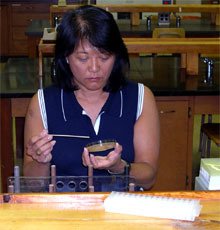Microbiologist Amy Cheng Vollmer Discusses Keys to Swine Flu Response
Microbiologist Amy Cheng Vollmer
Discusses Keys to Swine Flu Response
by Alisa Giardinelli
5/01/2009
|
Amy Cheng Vollmer has taught biology at Swarthmore for 20 years. |
The best way for the public to confront fears of H1N1 Swine Influenza A (swine flu) is to practice basic good health, says Swarthmore microbiologist Amy Cheng Vollmer. In addition to information about transmission, people should be aware of factors contributing to susceptibility.
"Because your susceptibility depends on both the amount of virus to which you are exposed and the overall health of your immune system, the keys are to minimize exposure and maximize your immune responsiveness," says Vollmer, a professor of biology whose research focuses on bacterial stress response. "Think of this as a race - if a pathogen enters at a low concentration and your immune system is ready to respond, you win and don't get sick. If you are either exposed to a high concentration of the virus and/or your immune responsiveness is not at its peak, you'll be sick."
Swine Flu Information for the Swarthmore Community from Worth Health Center
According to Vollmer, minimizing exposure is specific for each pathogen. "The virus is transmitted through aerosol vapors that are the result of coughing or sneezing," she says. "Even if those small droplets that carry the virus alight on an inanimate object like a handrail, computer keyboard, or doorknob, the virus can persist for potentially several days. Hence the recommendation to wash your hands is a good one."
So why then, if handrails and doorknobs have viruses on them, are we not sick all of the time? Vollmer says it depends on how much of the pathogen you are exposed to and for how long. So the key, she adds, is to maximize your immune responsiveness, which "is universal and applicable to all infectious diseases."
How healthy is your immune system? That depends on several factors:
- age - the very young have immune systems that are not fully developed and the very old have immune systems that are no longer able to work to full capacity.
- sleeping habits - it is during sleep when your body restores and repairs; it is also when extra energy is stored away. Since the immune system is one of the most energetically expensive systems to run (and usually the first to be shut down when energy reserves are low), getting enough sleep every day is key.
- nutrition - your body is able to fully extract and store extra energy reserves if you have consumed essential nutrients and vitamins on a regular basis. Failure to do so diminishes the rate of your response to a pathogen.
- exercise - your immune system is most responsive when you are active and have good muscle tone - it helps your lymphatic fluids flow and that allows immune system cells to be most responsive;
- hydration - cells are 80% water, including the cells of your immune system. For them to operate maximally, you must drink water. Alcohol, salty foods, caffeine have dehydrating effects. Also mucous membranes in your nose and throat can trap viruses that come in through the air,. IF you are dehydrated the mucous does not trap as well.
- stress - chronic stress depresses your immune responsiveness.
- being immuno-compromised due to medication, pregnancy, and/or being sick already
Vollmer notes that after being exposed to a pathogen, an immune system will respond faster the next time it is exposed. "That is why vaccines work," she says. "A vaccine is a rehearsal for the immune system, tricking it into acting as if you were infected."
But for a virus that mutates as quickly and easily as the swine flu, Vollmer says finding a vaccine is difficult. "Viruses mutate by swapping viral DNA with other similar viruses," she says. "It would be like mixing two full decks of cards and coming up with a hybrid deck. Because the cards that are swapped cannot be predicted accurately, we cannot easily predict the next rendition of the flu."
Vollmer hopes that learning about swine flu will encourage people to take a more preventative, holistic approach to their health. "As a biologist, I am completely in awe of how healthy most of us are most of the time, given our exposure to many particles and organisms in the air and water," she says. "If we can learn from this outbreak some basic principles about how to maintain good health, then it will be a powerful lesson."



